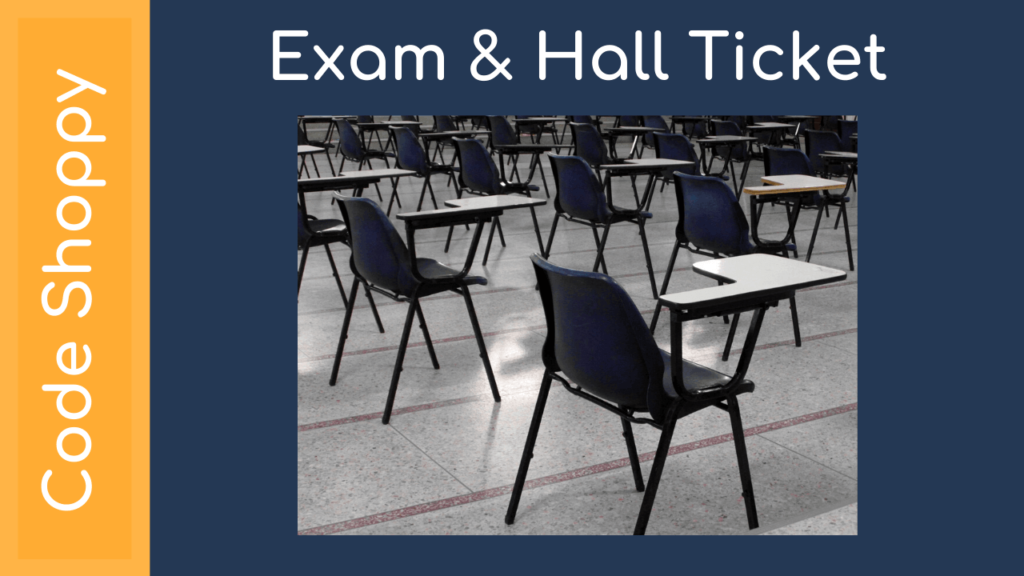Exam Hall Ticket Management System
Detection of Anomalous Behavior In An Examination Hall Towards Automated Proctoring
The paper proposes a workflow for the automaticdetection of anomalous behavior in an examination hall, towards the automated proctoring of tests in classes. Certain assumptions about normal behavior in the context of proctoring exams are made. Anomalies are behavior patterns that are relatively (and significantly) different. While not every anomalous behavior may be cause for suspicion, the system is designed to detection typical patterns for actions of concern such as discussions during an exam or the turning around or the passing of notes, etc.
This detection is based on features computed using the histogram of gradient orientations followed by a nearest -neighbor search through annotated patterns of pre- recorded clips to train the system for behavior that may cause concern. While there may be false positives, the system is intended as a decision support system to facilitate automatic proctoring of tests and deters malpractice.

In recent years, with the rapid development of computer technology, video surveillance technology has made considerable progress in many areas. But the traditional method of video surveillance is fulfilled by personnel monitoring, which is a heavy workload.Video Analytics is a technology that is used to analyze video for specific data, behavior, objects or attitude. This paper studies the automatic surveillance methodology in Examination hall, which can detect abnormal behavior in real time. It assumes that for any specific context, there is a notion of what constitutes normal behavior and conversely abnormal behavior. Anomalies stand out to be as different relative to the context of their surrounding in space of time. Hence it is a good way to solve this problem using this technology [1].
Video surveillance can be an effective tool for today’s businesses both large and small such as in video surveillance inexamination halls, security surveillance and deterring dishonest and deceitful behaviors [2].For such systems it is needed to design a core which uses a method to detect human actions, classify them based upon several actions in sequence.However, building an abnormal behavior recognition system is a challenging problem because of the variations in the quality of the video, environment size and certain postures of the humans. Environment of the examination room is crowded and dynamic, which imposes challenge for current approaches to video action detection because it is difficult to segment the student from the background due to disrupting motion from other objects and the scene. All of these make it difficult to satisfy the application in the real-world scene [5].Some of the main applications of Human Behavior detection are crime detection in sparsely populated areas like ATMs, automated sports commentary, intrusion detection, and detection of jaywalking on roads, characterization of human gait, person counting in a crowd, gender classification and fall detection for elderly people. In today’s world with increase in technology, systems can be developed and used to detect human activity. This paper aims at detecting human activities which are then classified into different categories. These categories are then studied, identified and interpreted as normal or abnormal behavior. The aim focuses on developing this system to urge an increase in the security system and services provided for the security of examination authority.The paper proposes a system for abnormal activity detection in examination hall videos using K Nearest Neighbour (KNN) which encode scene rules and are used to smooth sequences of actions. High-level behavior recognition is achieved by computing the probability that a set of predefined KNN’s explains the present action sequence.
This system is deployed in an examination hall where the student’s activities and behavior are monitored on a surveillance camera. System accepts video as the input and an automatic alerting system alerts the relevant authorities when required. Based on the predefined anomalies, the activities are categorized as normal or abnormal behavior.
This paper deals with designing an approach wherein it tries to detect any abnormal behaviors present in the videos. The system first works by detecting all students present in the video. After detecting all the students, it tracks the detected students throughout the course of the video. The features of the tracked students are calculated using HoG feature descriptor and then sent to the K-Nearest Neighbor classifier. The classifier is pre-trained to detect normal or abnormal actions. System is made to be adaptable to lots of different conditions as in, a user can choose the behaviors that they want the system to detect and train the system specifically for that. This means that it can be used across a variety of situations and conditions from normal surveillance to security related monitoring. This system is also capable of detecting abnormalities if there are more than five people in an exam hall. Learn More
In the area of machine learning confusion allows visualization of the performance of an algorithm. TABLE II indicatesConfusion matrix of the system. Each column of the matrix represents the instances in an expected class while each row represents the instance of the actual class. Confusion matrix reports the number of false positives, false negatives, true positives and true negatives. This allows more exhaustive analysis than mere percentage of correct guesses. All the diagonal values indicate the accuracy of each action detected.